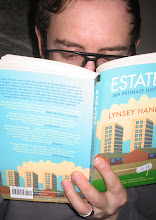Current read: Hackney, That Rose-Red Empire
Where / how acquired: Amazon
Vibe: Easterly
Whisked through Owen Sheers' Resistance over the past few days: perfectly enjoyably, a little light for my taste with a few too many hints of aga-saga but pleasantly enjoyable none the less. It's a 'what-if' historical fiction - D-Day has gone wrong and the Germans successfully invade the UK. A group of women in the hills bordering England and Wales wake to find their husbands gone (to join the Auxiliary Units fighting the guerilla war against the occupying Nazis, but that's about as much as you know about them), and are befriended by some nice thoughtful and considerate Germans and all sorts of drama ensues. I'd love to read a history, in fact, of the British resistance which never was - there's a historical footnote at the end of Sheers' book which is tantalising - will have to search that out...
And now for something completely different. Iain Sinclair, if you don't know, is the English WG Sebald and a marmite writer if ever there was one. His meandering, poetry/prose/history/geography/travel writing style needs some getting used to, but it does exert a sort of hyponotical pull once you're successfully entranced. Like many others, the first book of his I read was Lights Out for the Territory - top of the reading list for the literate east Londoner - and while I've infrequently returned to that book I haven't read anything else in the Sinclair canon in it's entirety. London Orbital in particular I must read...
Anyway, his latest is a door-stopping c.600 pages of Hackney history and musings and I await the local-history trance with glee. There's talk of Baader-Meinhof terrorists on the run, Lenin, Stalin (who I do know lived in Whitechapel; I didn't know of the Hackney connection) Orson Welles, Conrad and more, with much hand-wringing on the shopping mall-ification that the Olympics is bringing to this still partly untamed corner of our city. If it wasn't such a huge bastard of a hardback book I'd go and sit in some Clapton cafe or under some suitably grimy canal bridge to read it and get the full experience; as it is I'd have to be something enjoyed at home only. So what paperback novella or slim history should I read alongside it? Hmmm.
Thursday 3 July 1662
3 hours ago




